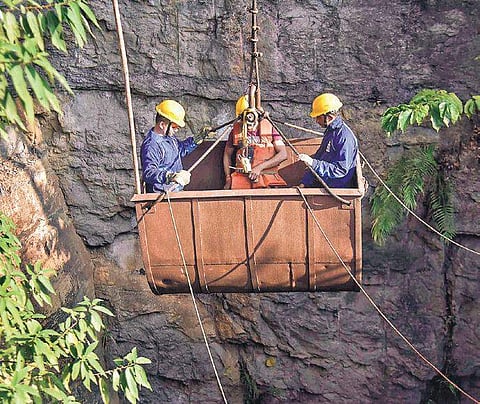

BHANGNAMARI (ASSAM): Saheb Ali still shudders at the mention of Ksan in Meghalaya’s East Jaintia Hills where 15 miners have been trapped in an illegal coal mine for more than a fortnight now.
Ali, 21, is among the five miners who managed to climb out of the coalmine unscathed, clinging on to dear life by clutching the wires of a motor pump even as flood waters rose rapidly in the dark pits of the mine 380 feet below. “I held on to the wire and started climbing, four others did the same,” he said at his home in Bhangnamari village located in Lower Assam’s Chirang district.
Three others from the village were not so lucky, they are still trapped in the flooded mine and villagers have given up hope of their survival. Recalling the incident, Ali said they entered the mine early in the morning of December 13. “I went to bed early the previous night as work begins at dawn. It was around 5 am when 22 of us went down around 380 feet into the pit,” he said, his voice still quivering with fear.
“The surface inside a coal mine where the miners are dropped by trolleys is called the ground. It is from here that coal stacked in baskets is lifted out of the mine with the help of cranes,” he explained. Once at the “ground” of the coal mine, miners have to enter tunnels to extract coal. “Eighteen miners, including me, were working inside the tunnels while four were in the ground to load the coal into the baskets.”
“I was around six to seven feet inside a tunnel. Some others had entered 300-400 feet,” Ali said. “My job was to carry the extracted coal to the ground.”
He said it was around 7 am while they were busy working inside the tunnels when he heard the sound of water flowing. “Suddenly I heard a loud noise of the flow of water and a strong wind. Realising what was in store, I thought I have to save my life. So, I came out of the tunnel as fast as I could. By then the water had flooded the ground and its level was rising,” he said. Trapped, Ali thought it was the end. “I thought I would die and I prayed that my body reaches home.”
It was then he and his four fellow survivors noticed the wires of a motor pump. They caught hold of the wires and started climbing. As they climbed, they noticed a miner coming down into the pit sitting in a trolley. They thought he had come to rescue them. But to their dismay, the trolley did not stop and went further down the pit. As it reached the water, the man jumped out and he too held on to the wires.
Call it a stroke of luck or otherwise, after a while, the trolley emerged from the water and started going upwards. All six of them somehow managed to climb into it and were eventually rescued.
“Even though I have survived, I have no joy as there are people trapped inside. One of them is my relative. I don’t think any of them is alive now. I spent that night with a friend at another coal mine. The next day my brother came and brought me home,” Ali said.
Despite knowing the dangers of working in these illegal mines, many labourers from far and wide flock there as the wages are high. Miners can earn up to Rs 1,500 a day. In contrast, farm labourers get only Rs 200-400. Contrary to reports, Ali claimed that 17 miners, not 15, are still trapped as altogether 22 had gone down. Two of those who survived are locals.
Ali’s mother, Sarita Bibi, said on learning about the risks involved in rathole mining, she asked him to return to the village. “Just three days before the incident he had told me on the phone how risky it was to work in a coalmine. I told him to come back home but he said he had to run the family,” she said outside their thatched house.
Ali’s sister Rejia Khatun thanked God for saving his life. “I came from Mangaldoi (where she is married) to see my brother. I am thankful to Allah for saving his life. It is sad that three youth from this village are among those who are trapped and are possibly dead,” she said. Ali is the family’s sole breadwinner. His elder brother, Saijal Rahman, too worked as a miner earlier but returned to the village after marriage. He now is a daily-wage earner. As he looked at the verdant paddy fields and reminisced, Ali said he would return to Meghalaya to work as a coal miner. Else, he stares at an uncertain future.